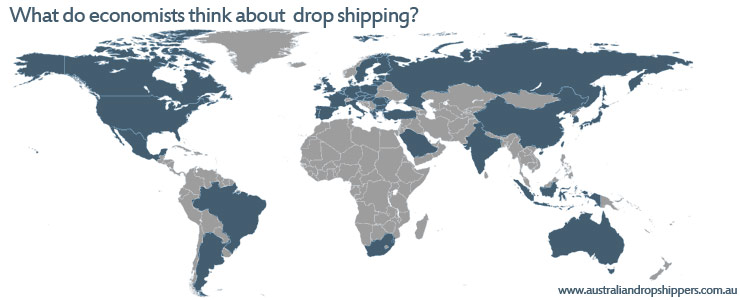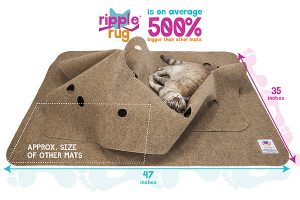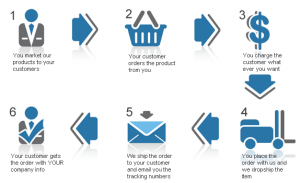
The worlds of internet drop shipping and online e-commerce have been the subject of considerable media scrutiny in 2016.
Respected publications such as Entrepreneur and The Economist have featured insightful articles about drop shipping as an economic activity; in the United States, a very popular show on National Public Radio (NPR) focused on how an American businessman came across drop shipping, and economists have contributed their own opinions about drop shipping.
The aforementioned NPR show was produced as an episode of Planet Money, a radio programme that provides incisive commentary on economic and financial matters. The episode, which is titled “Cat Scam,” is an in-depth story about the inventor of the “Ripple Rug,” an innovative cat toy that he sold through Amazon.
 The Ripple Rug was an astounding success for the American inventor. At one point, daily sales of the cat toy reached the $2,000 mark, and the inventor was ecstatic until an in-law came upon a listing of the Ripple Rug on eBay.
The Ripple Rug was an astounding success for the American inventor. At one point, daily sales of the cat toy reached the $2,000 mark, and the inventor was ecstatic until an in-law came upon a listing of the Ripple Rug on eBay.
In the beginning, the inventor thought that used Ripple Rugs were being sold on eBay, which he took as a compliment since it suggested that his cat toy creation had resale value. Seriously, though: who in their right mind would purchase a used cat toy? Upon further investigation of the eBay listings, the inventor realised that sellers were offering brand-new Ripple Rugs at a higher price than he sold them on Amazon.
A Coarse Introduction to Drop Shipping
The investor decided to try his luck with one of the eBay listings by purchasing one Ripple Rug, the cat toy he invented, manufactured and sold through Amazon. He noticed various listings, all selling 5 to 15 per cent higher than his set price; he was afraid that a copycat usurper may have stolen his design to cheaply manufacture Ripple Rugs in an Asian factory or in a Los Angeles sweatshop.
The eBay transaction was conducted smoothly as the seller first sent an email to confirm that the cat toy was being packed and shipped from a warehouse. When the package arrived, the inventor was surprised to unpack his own Ripple Rug, which was shipped from the same Amazon order fulfillment centre he is familiar with.
Although the inventor earned profit on the aforementioned order, he was not too happy with that particular order. He felt he was not in control of the product, brand and customer service; furthermore, he did not like seeing a few arbitraged dollars going to someone else’s pockets.
It would be safe to say that the introduction to drop shipping experienced by this inventor was not the most pleasant. He literally thought it was a Cat Scam. He felt that eBay sellers were scalping his invention at markup that was not necessary and should be regulated; however, not everyone felt the same way.
E-Commerce Familiarity = Drop Shipping Success
The NPR aforementioned NPR programme interviewed a couple who got into drop shipping through their familiarity with e-commerce. These two young Americans were civilian contractors working in Iraq, where they had to buy virtually everything online. This familiarity with e-commerce convinced them to further investigate the world of drop shipping right from their American outpost in Iraq.
After a very successful beginning that consisted of drop shipping popular toys related to the Star Wars franchise, the couple decide to leave their contracting jobs behind and move back to the United States. After clearing about a million dollars in annual sales, the couple expanded into wholesaling and private label operations, but they have not given up on drop shipping.
One of the secrets of this couple’s success in drop shipping is that they are very dedicated to quality control and customer service. Sure, they know how to take advantage of automation tools, but they treat their business almost as if they were the retailers.
What Economists Think About Drop Shipping
The Cat Scam radio feature is not entirely about the Ripple Rug; it is about drop shipping and how the internet makes it easy for entrepreneurs, who are as motivated by profit as the inventor, to become middlemen in the online global economy.
Drop shipping was twice described as being a genius business concept on the NPR feature. Arbitrage itself is nothing new; it goes back to the days of the Persian Empire when merchants sold their wares at bazaars, which are the ancient precursors of the modern retail trade, e-commerce and even stock markets. In those days, it was not uncommon to see merchants selling rugs from the same carpet maker at different prices; in fact, bazaar transactions welcomed bargaining and arbitrage opportunities.

Dropshipping Concept
In an Entrepreneur article about the Ripple Rug, a professor of marketing at the prestigious Wharton School of Business in Pennsylvania also called drop shipping a genius concept. In fact, he mentioned that he would be happy to see someone drop shipping his book, which is sold on Amazon, as long as he knew units were moving and selling at profit.
The Wharton professor likely adheres to the principle of laissez-faire economy, which favours free markets in lieu of regulation. The Ripple Rug inventor would like to see regulation of economic activities such as drop shipping while the Wharton professor would not mind seeing economies expanding thanks to drop shipping.
A Duke University professor of economics interviewed by Planet Money for the Cat Scam feature explained that e-commerce is ripe for arbitrage, which has the potential to become the most competitive practice in the world of online sales. This professor, who is very positive about drop shipping, was quick to mention various internet giants that are online middlemen just like drop shippers.
The first company mentioned by the Duke professor was Uber, the controversial personal transportation firm that relies on a mobile app to deliver its services. Uber is the ultimate middleman; this is a company that started with no vehicles, has no drivers on official payrolls, and does not really interact too much with customers. Uber simply takes a cut of financial transactions for connecting people, much like drop shippers do when they process orders.
The Uber business model is hardly unique; Airbnb, eBay and even Amazon are also internet middlemen, not to mention dozens of online travel agencies. The Duke professor sees drop shipping as a natural evolution of the middleman business model; he thinks that anything that can reduce time or cost in a transaction will always be welcomed by participants of a retail economy.
How Drop Shipping Benefits the Economy
Similar to modern drop shipping, arbitrageurs of the ancient Persian bazaars sought various profit opportunities. Rugs they would buy from merchants were taken to the desert camps of Bedouin tribes who did not want to venture into the bazaars for various reasons. Like the Bedouin tribes of yore, many online shoppers have various reasons for shopping on eBay instead of doing so on Amazon or other retailers.
At the end of the Cat Scam radio feature, the hosts explained that they reached out to eBay for comments about drop shipping. The sole response from the online

Drop shipping is driving modern eCommerce
retail platform is that they recognised drop shipping and arbitrage as legal practices.
As previously discussed in this article, economists see eBay as falling in line with the general business model of serving as a middleman, which means that the online giant seeks to profit from retail transactions in a manner similar to a drop shipping operation.
One advantage of modern arbitrage is that drop shippers often look for top selling products or novelty items that they believe are being undersold. This tenet of drop shipping has an interesting positive effect on products: it sharply reduces the potential for counterfeiting. Just like the Ripple Rug inventor was relieved to learn that his item was not being counterfeited or cheaply copied in Chinese factories, other manufacturers would rather see arbitrageurs spiking up sales than forgeries seizing their profits.
An even greater economic benefit of drop shipping is that it prompts entrepreneurs to seek greater profit opportunities in the world of e-commerce. The former civilian contractors in Iraq who returned to the U.S. as full-time drop shippers are now engaged in wholesaling and selling their own line of white label products; this is something that many individuals seek after they gaining experience with e-commerce operations. Once drop shippers get the hang of using platforms such as Magento, Shopify and Zen Cart, it does not take them long to start looking into running their own retail shops.
In the early days of e-commerce as we know it today, some economists believed that arbitrage would come to an end because of the perfect information theory. If shoppers have equal access to pricing information thanks to the wealth of information available online, it stands to reason that pricing would, at some point, be equal across the board. Decades after the debut of the graphical World Wide Web, there is no indication of a move towards equal pricing; in fact, the diversity of price levels on the internet can be described as being a genesis of sorts for drop shipping.
If anything, drop shipping is having a positive effect in terms of customer service and experience. Drop shippers who operate as one-man shops are more likely to excel at customer relations than big retailers, and this is a matter of scale. A large manufacturer of widgets that sell for $3 is unlikely to offer customer service whereas a drop shipper seeking a 15 per cent profit will probably go out of his or her way to help shoppers with their orders.
In the end, as long as drop shippers approach this business practice with a positive attitude and with the intention of helping shoppers, the economy will continue to benefit.
Relating this to the Australian market, recently there has been a massive swing towards drop shipping with more and more online sellers choosing to partner with international drop shippers to deliver their products locally.
There has also been an increase of local wholesalers choosing to engage in drop shipping, it’s a concept that works globally, so there is no reason that drop shipping can’t work in Australia. If anything, because the drop shipping concept is still in its infancy stage, it can reap in higher margins as there is a lot less competition in this space.

 Enter Here For A Free Preview Of The Largest Global Drop Shipper Index On The Net
Enter Here For A Free Preview Of The Largest Global Drop Shipper Index On The Net








